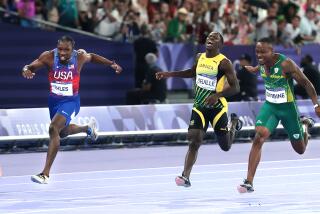Cougars Had the Time, but Not Right Call
- Share via
Washington State had time to run one more play at the end of Thursday’s Rose Bowl game if it hadn’t spiked the ball in an attempt to stop the clock, according to the man who held the official timer in his hand.
Bruce Fitzpatrick, a professor at El Camino College who has been the official timer at the Rose Bowl since 1978, said Friday that the two-second frenzy at the end of Michigan’s 21-16 victory on New Year’s Day was “one of those hairline things you see every once in a while in football.”
Fitzpatrick, tethered to an on-field position on the south 25-yard-line on the east side of the stadium--the Washington State side opposite the press box--said that, while all the action was going away from him toward the north end zone, he was “fixated” on referee Dick Burleson, who makes the signals that allow Fitzpatrick to start and stop the clock.
“It looked to me like Washington State knew exactly what to do once the first down was made and the clock was stopped to move the chains,” Fitzpatrick said. “They hurried down the field to get in position, because they knew that the referee would start the clock again when the chains were set.
“I watched closely. I was fixated on Burleson. That is my job. Once the chains were set and the ball was placed, Washington State seemed ready. Burleson was in his position in the backfield, to the right of the quarterback, and when he gave the signal--the windmill thing that was referred to in the paper this morning--the quarterback couldn’t see him without turning to look over his shoulder. So maybe they lost a split second there.
“When I saw the signal, I started the clock. After the snap and the spike, Burleson didn’t signal for the clock to stop. He made kind of a gesture that said to me that it was all over. So I never pushed the button to stop it.
“But in my considered opinion, and that’s all this is is an opinion, had the quarterback just tapped the center on the butt and got a quick snap, I think he would have made it [in time to run one last play].”
Fitzpatrick, part of a game-management team directed by Kevin Ash and a crew from USC that has handled the Rose Bowl for many years, said that the officials handled everything well.
“The ref was absolutely correct in what he did,” Fitzpatrick said. “I spent time with him and the crew the day before the game, and he was very careful and very professional about telling all the people involved with timing exactly what he wanted.”
Fitzpatrick said that there was a further indication that the now infamous final two seconds of the 1998 Rose Bowl were managed correctly by all--except perhaps Washington State.
“There is a backup timer on the field right with me, a man named Bob Knouse,” Fitzpatrick said. “He does the entire game with a hand-held clock, just in case the scoreboard clock goes down. That happened twice this year in other games in the Rose Bowl.
“When it ended Thursday like it did with those last two seconds, I turned to Bob and asked if he had run out of time on his clock. He said, ‘Yes, it’s over.’ ”
More to Read
Go beyond the scoreboard
Get the latest on L.A.'s teams in the daily Sports Report newsletter.
You may occasionally receive promotional content from the Los Angeles Times.











